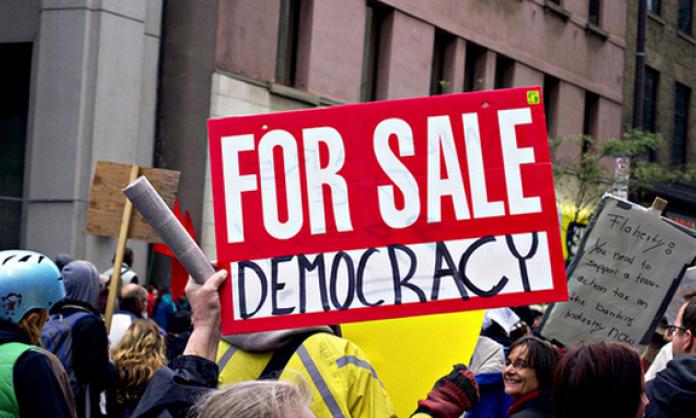The revelation that a Chinese businessman paid $1,670 to cover a travel bill for ALP senator Sam Dastyari has lifted the lid on the money politics that dominates Australian political life.
That one of Australia’s leading politicians, already handsomely rewarded with a salary of $200,000 and a generous expense account, regards businesses as a handy ATM to pay his personal expenses illustrates the moral sewer that is the Australian parliamentary system. This is not the first time that Dastyari has tapped Minshen Zhu, boss of private education provider Top Education Institute, for money; he also received $5,000 from Zhu to help pay his legal bills in late 2014.
But Dastyari’s indiscretions are only small change. Corporations and wealthy individuals pour millions of dollars every year into the political system, and no one bats an eyelid.
This is second nature for the Coalition, which stands proudly as the leading political representative of the wealthy. No money is too tainted for them: the banks, mining companies, arms manufacturers, the tobacco and alcohol industries or property developers.
In 2014-15, the Liberal Party received $210,000 from Pratt Holdings (which, coincidentally, paid no tax on an income of $2.5 billion in the Abbott government’s first year in office). It also received a combined total of $370,000 from the NAB, ANZ bank and Macquarie group; $245,000 from the Australian Hotels and Hospitality Association; $127,000 from energy company Woodside Holdings; and $125,000 from private health care group Paul Ramsay Holdings. And that’s just a splash from the gushing torrent of big money oiling the wheels of the Liberal Party’s operations.
The Labor Party also stands in line with its hands out for corporate cash. In 2014-15, the hotels’ association gave $171,000 to the Victorian branch of the ALP; another $66,000 came into the national office from ClubsNSW. The ANZ bank and Macquarie group donated a combined total of $150,000 to the ALP; financial firm Deloitte Touche Tohmatsu, $64,000; stevedoring and logistics company Asciano, $64,000; Google Australia, $60,000; and Cabcharge, $50,000.
The Coalition says that this kind of fundraising is different to the money picked up by Dastyari because these were donations to parties rather than gifts to individuals, which are much more closely connected to outright graft and pressure for individual favours. But in practice, the distinction is not at all cut and dried.
What are we to make of deputy prime minister Barnaby Joyce receiving $50,000 from Gina Rinehart towards his election expenses in 2013? What about the all-expenses-paid trip for Joyce and Julie Bishop to attend a wedding in India in 2011? Or the numerous “study tours” paid for by foreign governments, businesses and wealthy individuals, with luxury accommodation and business class travel thrown in? The Liberals are just trying to seal off Dastyari’s gift from what is actually a much broader problem of corporate cash opening doors and winning influence in Australian politics.
Whether a personal gift or a party donation, all the big money handed over to politicians and political parties is meant for one purpose only: to win political favours. It is no coincidence that the biggest donations come from those corporations and individuals whose fortunes are most tightly connected to political decisions, whether it be zoning for property development, gambling licences or arms contracts. These people didn’t get rich by being stupid or reckless with their money.
We know that mining companies poured big bucks into the coffers of the Coalition parties to help them fight the Rudd and Gillard government’s mining tax in 2010 and 2013. We won’t know for sure until donations are reported by the Australian Electoral Commission early next year, but it’s odds-on that the banks were generous donors to the Coalition at this year’s federal election as they sought to fend off Labor’s proposed royal commission into the banking and financial sector. Infrastructure companies don’t give money to political parties out of the goodness of their heart but to help them when it comes to state and federal governments divvying out contracts on the next freeway, hospital or port.
It was only when the stink of corruption and the embarrassment of one too many ICAC inquiries and court cases became overwhelming that the ALP government in NSW banned donations from property developers to state politicians in 2009. But no such restriction is in place to prevent developers donating money to parties contesting elections to local councils, which are actually the critical jurisdiction for zoning decisions. And the ALP remains more than happy to take money from the hotels and gambling companies that relentlessly lobby state governments to have regulations relaxed on pokies or casinos or their number restricted.
Both parties also organise fundraising dinners at which premium-priced tickets are sold at anything up to $20,000 a pop to those wanting to have a private conversation with a politician. The more you pay, the closer you get to the planning minister, the finance minister or, at the most exclusive table, the premier or federal leader. Even if a political and commercial deal is not made on the night, attendance at these events is designed to lubricate personal relations with the political decision makers, to be capitalised upon next time a political favour is needed.
Political donations are not the main means by which the capitalist class ensures that the major parties do its bidding. The broader context of capitalist power both inside and outside the machinery of the state ensures that for any party to have a hope of winning and keeping office, it has to pursue pro-capitalist policies. But donations do help to tilt the playing field in favour of one section of the capitalist class as against others. And they ensure that the political parties can maintain their operations without having to be entirely dependent on public funding, which varies depending on their share of the vote.
‘Yellow peril’ over again
The Liberals were able to seize on Top Education’s gift to Dastyari not just because it was a gift but because it came from a Chinese businessman and provided an opportunity for the party to ratchet up what is already growing paranoia about Chinese influence in Australian politics.
That Dastyari had also been effective in Senate inquiries targeting big business for non-payment of tax and was a factional heavy in the NSW branch of the ALP were bonus reasons for the Liberals to target him. His ineptitude in defending himself only sealed his political downfall, short term though it may be.
The Liberals painted Dastyari as a “Manchurian candidate”, that is, an agent for a foreign and hostile power, because he dared to contravene bipartisan policy on China’s military activities in the South China Sea. The political right was able to use Dastyari’s gift from a Chinese businessman to tap into what is rising concern in the ranks of the broader ruling class about the influence of China’s “soft power” in Australian politics.
In recent years, the Australian ruling class has become increasingly involved in efforts by the US to maintain its domination of the Asia-Pacific in the face of a rising China. Australian capital is most enthusiastic about the US’s “pivot to Asia”, which will result in a greater deployment of US naval power to the region.
With the blessing of the Gillard Labor government, the US military has begun to increase significantly its presence in northern Australia, with a US base on the outskirts of Darwin regularly rotating 2,500 US marines, increased military flights into and out of Tindal RAAF base outside Katherine, increased visits to Australian ports in the NT, WA and Queensland and more intensive use of what is Australia’s main asset for the US, the Pine Gap surveillance centre outside Alice Springs.
The economic counterpart of the pivot is the Trans-Pacific Partnership, which aims to organise the regional division of labour around the interests of US corporations and those of its allies, while excluding China. The TPP has been strongly supported by both Labor and Coalition governments.
Attempts to curb China’s rising power have also translated into steps to limit purchases of what is deemed to be sensitive commercial infrastructure. Within two months of taking office, the Abbott government upheld the ban initially imposed by the Gillard government on Chinese company Huawei bidding for work on the National Broadband Network. This followed the earlier rejection of a bid by Chinese company MinMetals for OzMinerals on the grounds that its main mine in South Australia is adjacent to the Woomera missile testing range. The exclusions continue today, with treasurer Scott Morrison’s recent decision to ban Chinese and Hong Kong companies from buying 50.4 per cent of electricity generator Ausgrid’s “poles and wires” in NSW.
This increasingly aggressive stance is not universally supported by the ruling class. China is now Australia’s largest trading partner and fifth largest foreign investor. The recently signed free trade agreement is premised on trade and investment links expanding further. Already, 120,000 students from China are enrolled in Australian universities, and the Chinese now constitute the largest tourism market for Australia. The aim is to take this further, along with bigger exports of agricultural goods and a more significant presence In China for Australian professional service companies – finance, architecture, business services.
The fact that billions of dollars are to be made on trade and investment ties with China explains why individuals with strong commercial ties with the country, for example, former Labor leaders Paul Keating, Bob Hawke and Bob Carr, along with businessmen Kerry Stokes and James Packer, are concerned that Australia’s increasingly aggressive posture towards China is hampering their future business opportunities. They are urging the Australian government to encourage the US to accept a greater role for China in the region, in line with its rising economic power.
But the “containment” strategy is dominant, especially so in the security and foreign policy establishment and also in the media – China has to be put back in its box, say the hawks.
An increasingly aggressive foreign policy and military posture are, unsurprisingly, mirrored by an ever more intensive scare campaign about the “enemy within”. At the hard end of this are allegations that Chinese businesspeople, political operatives and students are carrying out intensive spying operations in Australia. At the soft end is concern that Chinese funding is subverting universities and media to ensure a steady stream of Communist Party propaganda whose aim is to win the public away from the confrontationist strategy now dominant in Canberra.
Scratch the surface of this barrage of anti-China propaganda and you can quickly discern a deep thread of Yellow Peril with its deep roots in the racist history of this country. That’s why it’s been latched onto by the far right, which supplements Muslim-bashing with scare campaigns about Chinese investors driving up house prices and buying up farmland.
This is the context for the Liberal Party’s campaign to bring down Dastyari. They know that it fits into the broader political positioning of China as the big new threat to Australian interests.









